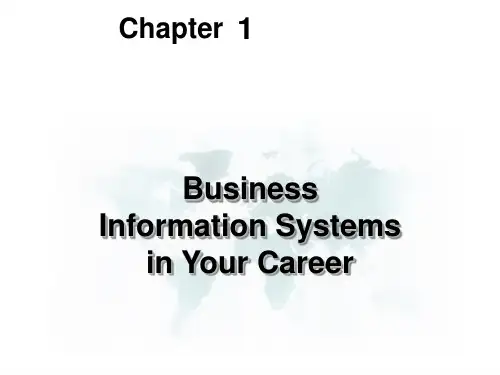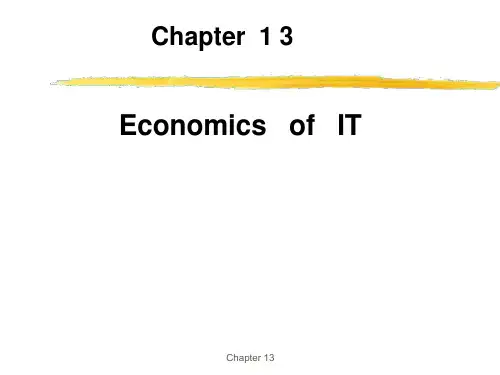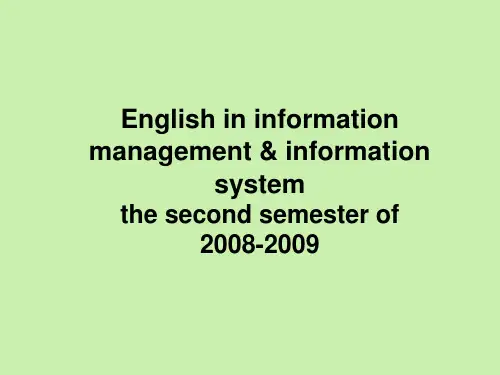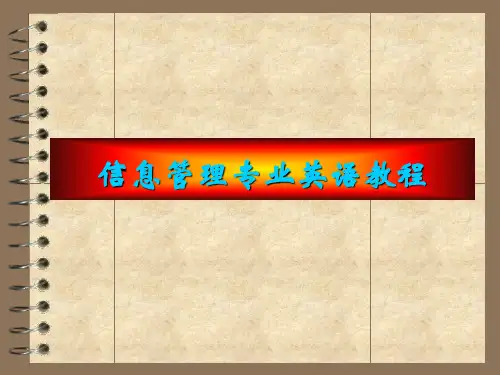信息管理专业英语教程1 .ppt
- 格式:ppt
- 大小:189.51 KB
- 文档页数:19
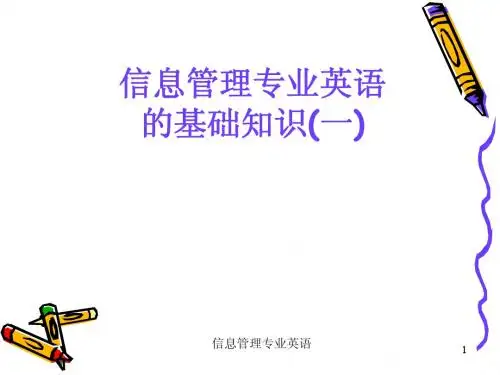
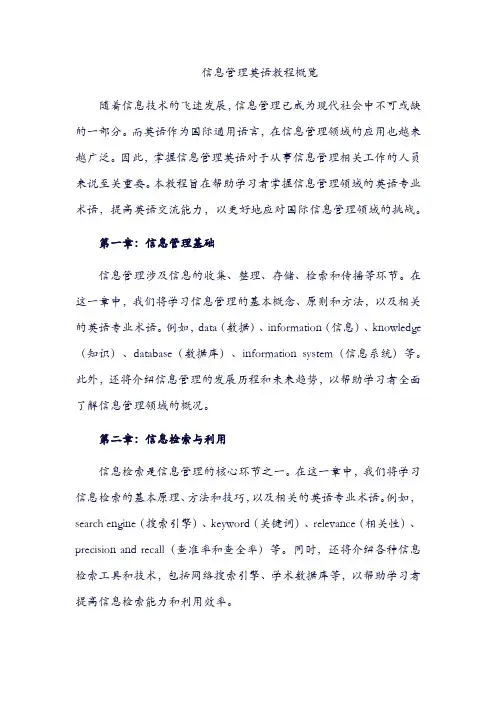
信息管理英语教程概览随着信息技术的飞速发展,信息管理已成为现代社会中不可或缺的一部分。
而英语作为国际通用语言,在信息管理领域的应用也越来越广泛。
因此,掌握信息管理英语对于从事信息管理相关工作的人员来说至关重要。
本教程旨在帮助学习者掌握信息管理领域的英语专业术语,提高英语交流能力,以更好地应对国际信息管理领域的挑战。
第一章:信息管理基础信息管理涉及信息的收集、整理、存储、检索和传播等环节。
在这一章中,我们将学习信息管理的基本概念、原则和方法,以及相关的英语专业术语。
例如,data(数据)、information(信息)、knowledge (知识)、database(数据库)、information system(信息系统)等。
此外,还将介绍信息管理的发展历程和未来趋势,以帮助学习者全面了解信息管理领域的概况。
第二章:信息检索与利用信息检索是信息管理的核心环节之一。
在这一章中,我们将学习信息检索的基本原理、方法和技巧,以及相关的英语专业术语。
例如,search engine(搜索引擎)、keyword(关键词)、relevance(相关性)、precision and recall(查准率和查全率)等。
同时,还将介绍各种信息检索工具和技术,包括网络搜索引擎、学术数据库等,以帮助学习者提高信息检索能力和利用效率。
第三章:信息安全与保护信息安全是信息管理领域的重要议题。
在这一章中,我们将学习信息安全的基本概念、原则和方法,以及相关的英语专业术语。
例如,cybersecurity(网络安全)、encryption(加密)、firewall(防火墙)、malware(恶意软件)等。
此外,还将介绍信息安全管理的策略、技术和工具,以帮助学习者了解如何保护信息安全、防范网络攻击和数据泄露等风险。
第四章:信息系统开发与管理信息系统是信息管理的基础设施。
在这一章中,我们将学习信息系统开发与管理的基本原理、方法和过程,以及相关的英语专业术语。
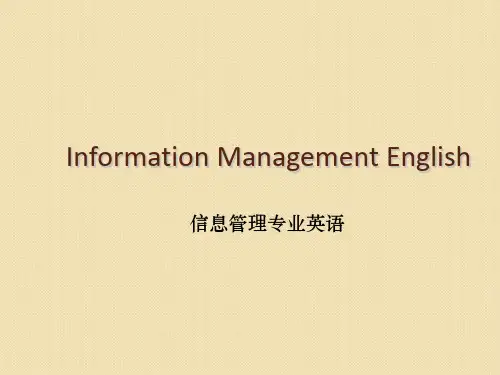
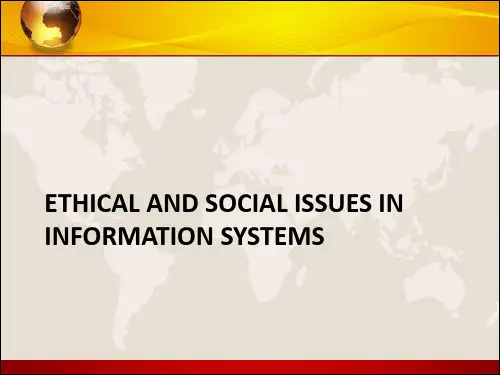
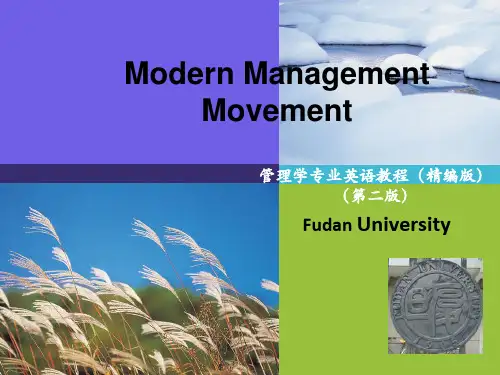

Data(数据), Information(信息), Knowledge, and Wisdom(智慧) There is probably(可能) no segment(项) of activity in the world attracting(吸引) as much attention(注意) at present as that of knowledge management(管理). Yet as I entered this arena(领域) of activity I quickly found there didn't seem to be a wealth(丰富) of sources that seemed to make sense in terms of defining(定义) what knowledge actually was, and how was it differentiated(区别) from data, information, and wisdom. What follows is the current level(水平) of understanding I have been able to piece together(拼凑) regarding data, information, knowledge, and wisdom. I figured(认为) to understand one of them I had to understand all of them.According to Russell Ackoff, a systems theorist(理论家) and professor of organizational(组织的) change, the content(内容) of the human mind(意识) can be classified(分类) into five categories(范畴):Data: symbols(符号)Information: data that are processed(处理) to be useful; provides answers to "who", "what", "where", and "when" questionsKnowledge: application(应用) of data and information; answers "how" questionsUnderstanding(理解): appreciation(评价) of "why"Wisdom: evaluated(有价值的) understanding.Ackoff indicates(指出) that the first four categories relate(联系) to the past; they deal(处理) with what has been or what is known. Only the fifth category, wisdom, deals with the future because it incorporates(结合) vision(想象力) and design(设计). With wisdom, people can create the future rather than just grasp(掌握) the present and past. But achieving(达到) wisdom isn't easy; people must move successively through the other categories.A further elaboration(阐述) of Ackoff's definitions(定义) follows:Data... data is raw(未加工的). It simply exists(存在) and has no significance(重要性) beyond its existence (in and of itself). It can exist in any form(形态), usable or not. It does not have meaning(含义) of itself. In computer parlance(用法), a spreadsheet(电子数据表) generally(一般地) starts out by holding(含有) data. Information... information is data that has been given meaning by way of relational(相关的) connection(连接). This "meaning" can be useful, but does not have to be. In computer parlance, a relational database(数据库) makes informationfrom the data stored within it.Knowledge... knowledge is the appropriate(适当的) collection(组) of information, such that it's intent(目的) is to be useful. Knowledge is a deterministic(确定性的) process(过程). When someone "memorizes"(记忆) information (as less-aspiring(消极的) test-bound(被考试束缚的) students often do), then they have amassed(积聚) knowledge. This knowledge has useful meaning to them, but it does not provide for, in and of itself, an integration(整合) such as would infer(推导) further(更多的) knowledge. For example, elementary school(小学) children memorize, or amass knowledge of, the "times table"(乘法表). They can tell you that "2 x 2 = 4" because they have amassed that knowledge (it being included(包含) in the times table). But when asked what is "1267 x 300", they can not respond(回答) correctly because that entry(内容) is not in their times table. To correctly answer such a question requires(需要) a true cognitive(认知的) and analytical(分析的) ability that is only encompassed(包含) in the next level... understanding. In computer parlance, most of the applications(应用) we use (modeling(建模), simulation(模拟), etc.) exercise(使用) some type of stored knowledge.Understanding... understanding is an interpolative(添加的) and probabilistic(或然的) process. It is cognitive and analytical. It is the process by which I can take knowledge and synthesize(合成) new knowledge from the previously(以前) held(持有的) knowledge. The difference between understanding and knowledge is the difference between "learning" and "memorizing". People who have understanding can undertake(担任) useful actions(行动) because they can synthesize new knowledge, or in some cases(情形), at least new information, from what is previously known (and understood). That is, understanding can build upon currently(当前) held information, knowledge and understanding itself. In computer parlance, AI(人工智能) systems possess(拥有) understanding in the sense(意义) that they are able to synthesize new knowledge from previously stored information and knowledge. Wisdom... wisdom is an extrapolative() and non-deterministic(非确定的), non-probabilistic(非或然的) process. It calls(调用) upon all the previous levels of consciousness(意识), and specifically(特别地) upon special types of human programming() (moral(道德的), ethical(伦理的) codes(代码), etc.). It beckons to(示意) give us understanding about which there has previously(以前) been no understanding, and in doing so, goes far beyond understanding itself. It is the essence(本质) of philosophical(哲学的) probing(探索). Unlike the previous four levels, it asks questions to which there is no (easily-achievable) answer, and in some cases, to which there can be no humanly-known answer period(时期). Wisdom is therefore(因此), the process by which we also discern(辨别), or judge(判断), between right and wrong, good and bad. I personally believe that computers do not have, and will never have the ability to posses(拥有) wisdom. Wisdom is a uniquely(独特地) human state, or as I see it, wisdom requires one to have a soul(心灵), for it resides(存在) as much in the heart as in the mind. And a soul is somethingmachines will never possess (or perhaps I should reword(改写) that to say, a soul is something that, in general, will never possess a machine).Personally I contend(主张) that the sequence(序列) is a bit less involved(涉及) than described(描述) by Ackoff. The following diagram(图表) represents(表现) the transitions(变化) from data, to information, to knowledge, and finally to wisdom, and it is understanding that support the transition from each stage(等级) to the next. Understanding is not a separate(独立的) level of its own.Data represents a fact or statement(陈述) of event(事件) without relation to other things.Ex: It is raining.Information embodies(包含) the understanding of a relationship of some sort, possibly cause(原因) and effect(结果).Ex: The temperature(温度) dropped(下降) 15 degrees(度) and then it started raining.Knowledge represents a pattern(模式) that connects and generally(一般地) provides a high level of predictability(预言) as to what is described or what will happen(发生) next.Ex: If the humidity(湿度) is very high and the temperature drops substantially(充分地) the atmospheres(大气) is often unlikely to be able to hold the moisture(湿气) so it rains.Wisdom embodies more of an understanding of fundamental(基本) principles(原理) embodied within the knowledge that are essentially(本质上) the basis for the knowledge being what it is. Wisdom is essentially systemic(系统化的).Ex: It rains because it rains. And this encompasses(包含) an understanding of all the interactions(相互作用) that happen between raining, evaporation(蒸发), air currents(流通), temperature gradients(梯度), changes, and raining.Yet, there is still a question regarding(关于) when is a pattern knowledge and when is it noise(垃圾数据). Consider the following:Abugt dbesbt regtc uatn s uitrzt.ubtxte pstye ysote anet sser extessibxtedstes bet3 ibtes otesb tapbesct ehractsIt is quite likely this sequence represents 100% novelty(新奇), which means it's equivalent(等于) to noise. There is no foundation(基础) for you to connect with the pattern(模式), yet to me the statements are quite meaningful as I understand the translation with reveals(显露) they are in fact Newton's 3 laws of motion. Is something knowledge if you can't understand it?Now consider the following:I have a box.The box is 3' wide, 3' deep, and 6' high.The box is very heavy.The box has a door on the front of it.When I open the box it has food in it.It is colder inside the box than it is outside.You usually find the box in the kitchen(厨房).There is a smaller compartment(分隔) inside the box with ice in it.When you open the door the light comes on.When you move this box you usually find lots of dirt(灰尘) underneath(在...下面) it. Junk(垃圾) has a real habit of collecting on top of this box.What is it?A refrigerator(冰箱). You knew that, right? At some point in the sequence you connected with the pattern and understood it was a description of a refrigerator. From that point on each statement only added confirmation(确认) to your understanding.If you lived in a society that had never seen a refrigerator you might still be scratching(搔) your head as to what the sequence of statements referred(针对) to. Also, realize(认识到) that I could have provided you with the above statements in any order and still at some point the pattern would have connected. When the pattern connected the sequence of statements represented knowledge to you. To me all the statements convey(传达) nothing as they are simply 100% confirmation ofwhat I already knew as I knew what I was describing(描述) even before I started.译文:数据,信息,知识,和智慧目前,世界上可能有不断的活动吸引尽可能多的注意力去关注知识管理。
